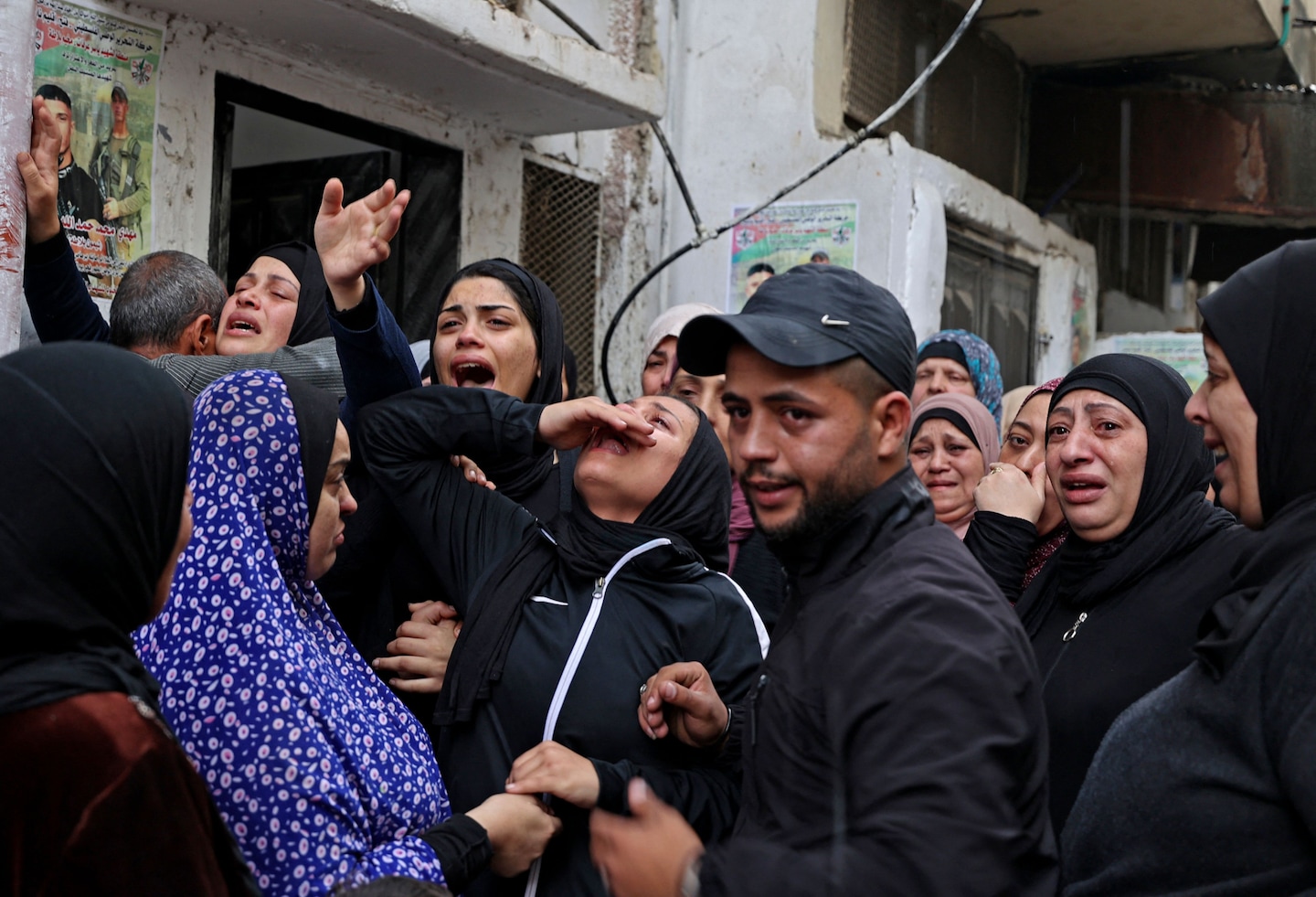Palestinian and Israeli rights groups and U.N. experts have blamed the bloodshed on Israel’s excessive use of force and open-fire rules during near-daily military operations, as well as rising assaults by settlers in the West Bank, where Palestinians live under Israeli occupation. Israel said its forces are responding to fatal attacks on Israelis by Palestinian militants, which have also spiked this year.
Israeli security forces killed 146 Palestinians in the West Bank and predominantly Palestinian East Jerusalem through Dec. 19 of this year, compared with 75 in 2021, according to figures provided by the U.N. Office for the Coordination of Humanitarian Affairs, or OCHA. Four more Palestinians in the West Bank were killed by Israeli settlers, OCHA said.
Most of the Palestinians were killed during Israeli military raids and clashes in the West Bank cities of Jenin and Nablus, according to the United Nations. More than half were under age 25. Among those killed were two U.S. citizens — Al Jazeera journalist Shireen Abu Akleh and 78-year-old Omar Assad — whose deaths gained worldwide attention and sharpened international criticism of Israel.
In a statement to The Washington Post, Israel’s military said that “the vast majority of those killed by [Israel Defense Forces] fire … were involved in terrorist activity that posed a direct threat to human life.”
Israeli soldiers used live fire “when necessary” during “counterterrorism activities,” the statement continued, in response to “violent riots, which often include explosive devices, Molotov cocktails and rocks hurled at IDF soldiers and Israeli civilians.”
Attacks by Palestinians, including knife, bomb and shooting attacks in central Tel Aviv, downtown Jerusalem and West Bank settlements, killed 29 Israelis in 2022 — including soldiers and civilians — according to the country’s Foreign Affairs Ministry. Nineteen were killed by Palestinians from the West Bank, according to OCHA.
Many of the casualties in the West Bank this year were young Palestinians who have only ever known military occupation and the repressive politics of the Ramallah-based Palestinian Authority (PA), which was set up as a caretaker government three decades ago and is now widely unpopular.
“People are very very fed up, whether it’s in Jerusalem or Jenin or Nablus. The last 20 years have not shown any improvements in the situation,” said a spokesperson from the Palestinian rights group al-Haq, who spoke on the condition of anonymity for fear of reprisal by Israeli security forces, which raided the organization’s headquarters in Ramallah in August.
“The near-daily raids in areas under control of the PA show that the sovereignty of PA doesn’t exist,” the spokesperson said.
“We have a new dynamic in the West Bank and around Jerusalem” with a “new generation” of Israelis and Palestinians in conflict, Tor Wennesland, the U.N. special coordinator for the Middle East peace process, told The Post. “There is an urgent need to de-escalate.”
He cited “growing tension in so-called friction zones” — areas where Israeli settlements continue to encroach on Palestinian land and violence is mounting.
Also notable this year, analysts say, was the emergence of two new Palestinian militant groups — the Jenin Battalion and the Lions’ Den — both led by disaffected young men with local support networks, loyal online followings and easy access to arms.
Israel’s military declined to provide the number of internal investigations opened this year into potential misconduct related to Palestinian deaths. In September, Israel announced the results of its inquiry into the death of Abu Akleh, who was shot in the head while covering a military raid near Jenin in May.
The IDF said it found a “high possibility that Ms. Abu Akleh was accidentally hit by IDF gunfire fired toward suspects identified as armed Palestinian gunmen during an exchange of fire,” though it has not released evidence showing the presence of gunmen in the area. An investigation by The Post contradicted the IDF’s claim that there was an exchange of fire in the minutes before Abu Akleh was killed.
The IDF said it would not pursue criminal charges against the soldiers.
“No one is being held accountable in most cases where Palestinians are killed,” said Dror Sadot, spokesperson for the Israeli human rights group B’Tselem, which also tracks Israeli and Palestinian casualties and military violations. “There is no one demanding accountability.”
Far-right politician Itamar Ben Gvir, slated to become Israel’s next national security minister, has proposed giving police and soldiers wider latitude to use live ammunition and shielding them from criminal prosecution for killing or injuring Palestinians.
The al-Haq spokesperson said that many of those slain in Israeli raids this year appeared to be bystanders, or were victims of excessive force.
In early December, Israeli fire killed teenage girl in Jenin who was on her roof as a raid unfolded nearby, Wennesland told the U.N. Security Council this month. Days earlier, he said, Israeli forces fatally shot a 16-year-old boy who was throwing stones at a checkpoint outside Ramallah.
“The continued killings of Palestinians by Israeli security forces in incidents where they did not appear to present an imminent threat to life” are “disturbing,” he said in his statement.
“I am increasingly concerned by the fragility of the current political and security dynamics, particularly in the occupied West Bank, including East Jerusalem,” he added.


